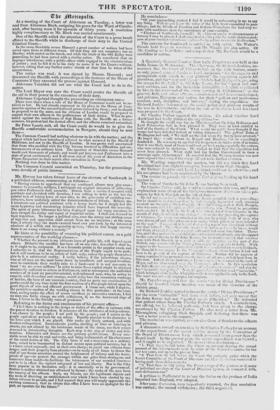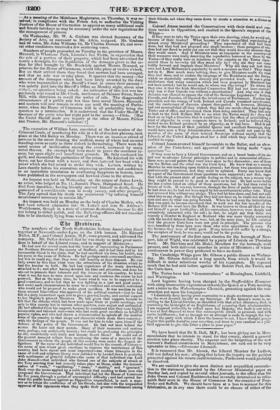A Quarterly Genoa', Coort of East India Proprietors was held
at the India House on Wednesdey. The Chairman, Sir Richard Jenkins, an-
nounced that the Court of Directors had; on the I lilt instant, mani- mously passed vGtes of tllanks tu, Lord Auckland, " for the aagacity and promptitude with aehleh he laid planned" the expedition against Af- ghanistan, amid the " zeal .-:1!,1 u ipar which he had aisplayed hr preraring the troops for the fit Ii ;" t. cil John Keane, for his " great and emi- nent services-, ead for the invincible intrepidity :eel spirit manifested by him in the eon u'-- of tie ,roty serving in thanistan ;" to the general, field, aa,l. ,:the;connnissioned mid non-commissioned, and privates, European and Eative, for their " gallant and meritorious conduct, zeal, discipline, and bravery," during the expedition. Sir Richard Jenkins clescanted on the soma' policy and glorious results of the war in Afghanistnn and then the Yob: of thanlis to Lord. Auckland was proposed to the Court.
Sir Charles Forbes opposed the ;notion. Ile asked whether Lora Auckland had really planned. the expedition ?-
lie thought the credit wns due to alhalsters—that Sir John Hobhouse and Lord Palmerston had, in fact, planned it. They were at least entitled to half of the thanks of the Court. What would the peldie have thought if the troops luau been defeated instead of taking Ghuinee ? The gallant Duke of Wellington haul said, " We shall see the end when the troeps have returned." He hoped they would return to Bengal and Bombay, but he exceedingly doubted it. He was sorry to say that the troops were in !inch a state of sickness, that it was likely most of them would not get trek again, especially the natives, who were reduced to skeletons, lie wished to God find the expedition had
never been plannsa. tat right had the Indian Government to force a sovereign upon AIItauuistan ? Ile asserted that the Western frontier was now more exposed than ever, if the troops aid not make further advances.
Mr. Weedi»g supported the motion, but did not think that Lord Auckland had. done right in acceptina honours from Shah Shoojah.
Sir Richard Jenkins said, Lova Auek liana ceedd not du otherwise ; and his acceptance had been sanctioned by the Queen.
The resolution paseed ; e4r Caarlee Fora es :Cone leading up his hand against it. The vote of' thanks to Sir John K exec. having. been read, Sir Charles Forbes said, Ile would not consent to this vote, until some explanation were given of the batharous massacre of persons: takea pri- soners by Schell Shoeiah on the 7th of J uly-
He did not awan to 5,n• that Sir John J any seconded sucli a proceeding; but he should be OA t iwac that he bad trauury del recitcd each atrocious conduct on the tart of Shah Shoujoh. Ilea did it liapp,n that Shah Shoojah, who was surround..d iv advi,...1-s tind 1,111tery, v-as ndlowed to peritetrate such cruelty ? He !Isla hi his hend t 7ottors dated from Chuznee in the month of July, in which it was :,tated, " • ',at on the day preceding the capture of Chumice, the camp was attacked in the rear by a large bady of men, who were driven off and sow prisoners were made, which Fri:mt.:Ts were beheaded Oh the spot." is."0..r, exild it be sf:.i.i• that such a report was circulated without ally foundation ? ol-ioer who wrot.! tl,at lettor, so fur :Is he knew, would not think of circulatio;,:ncli a rcport v;ithout it 11:1(1 some foundation. There- fore, until that mat ter -,vas oNp;flined, be eumimi not conscientiously give his support to this vote of thanks to Sir John Keene; for he would contend, that whoever were with Shah Shoojllt in a :..q.acity, on the part of the
British, were accomv able for rIl e•-:::e hint 1,, pt people to death. With respect to the honour: and c.■:11:...cd on some individuals,
he thought it was unjust to th,. oly.4 (.11.;,.re. -.0103e fortune it had not been to be present at the captue• of i;lazmy. Neither Iki he approve of
young captains being promoted 0. I u-tIC of old had been done in
this case. Indeel. in ,,um E. h „ raised to the rank of
Major, and wa:: : this resolution
Sir John Keane -1"; i " • . • ! .;21. ,, . and also for his " invincible atonality:4 a.a•ass•• !' eith that word " invincible," which belonged :done to the Alinieh(y—e!...:Ii was applicable only to the Lord. The word was not only improper, but impious..
Mr. Poynder sugzested that the wonls " ureter div'me Providence" should be inserted where meatioa wal, made of the victories of the British army.
Sir Richard Jenkins agreed to insert the •vords " Divine Providence;" but the term "invincible " had been used before, and only meant that Sir John Keane had not " iplailed unit ler difficalties." He defended that gallant officer from Sir Charles Forbes's retack. A contradiction, not official, but he believed authentic, bad been given to the charge mentioned by Sir Charles Forbes. He also read a letter from Mr. Macnaghten, eulogizing Shah Shoojah, and declaring that there was " not a better man in the country."
The resolution was carried, as were also those of thanks to the officers and privates.
A discussion ensued on a motion by Si:' Charles Forhee for an account of the expenditure of the secret scrvica money by the Committee of the Board of Direetors—a baly which possessed more power than the Board itself. In the present year, the secret expenditure was 53,0001.; and it ought to be explained. He moved three resolutions-
" I. That these be lail before the Court an account showing the annual amount of the eisaersements made by order of the Secret Committee for the last ten years, and up to the present time. "2. That there be laid be14re the Court the authority under which the Secret Committee of tit,: Court of Directors con,ida t'2 .!-i.ie!ves warranted in having made those aisle:ea:Melds. "3. That there be !ail before the Court a copy of the protests or dissents of individual members of the Court of Directors azehest, or connected with, such disbursements."
A petition to Parliament to reluce the duties on the produce of India imported into England, was adopted.
After some discussion, very imperfectly reported, time first resolution was carried ; the second withdrawn ; the third. negatived.
At. a-Meeting of the Middlesex Magistrates, on Thursday, it was re- solved,i'in Compliance with the Prison Act, to authorize the 'Visiting Justices-of the House of Correction to appoint as many additional male and female turnkeys as may be necessary under the new regulations for the management of prisons.
On Wednesday, Mr. W. A. Graham was elected Secretary of the Society of Arts, as successor to Mr. Aikin, resigned. Mr. Graham had 96 votes, Mr. John Williams 94, Mr Charles Duncan 23, and seve- ral other candidates received.a few scattering votes.
.Numbers of people proceeded on Tuesday to the premises of Messrs. Hansard, in Whetsone Park, Lincoln's Inn Fields, in expectation that the sale of a portion of their property, which bad been advertised for nearly a fortnight, for the liquidation of the damages given in the ac- tion for libel brought by Mr. Stockdale against Messrs. Hansard, as printers for the House of Commons, would take place at twelve o'clock. But on their arrival there they found that matters had been arranged, and that no sale was to take place. It appears that the money—the *Mount of the damages which had been lately awarded by the Jury who were impannelled at the Sheriff's Court to assess their amount— was quietly paid into the Sheriff's Office on Monday night, about nine o'clock, no questions being asked. An intimation of this fact was im- mediately sent round to Mr. Crook, auctioneer, of Skinner Street, Snow Hill, with directions to recall the notice of sale. The disagreeable circumstance of a public sale has thus been saved Messrs. Hansard ; and matters will now remain in stain quo until the meeting of Parlia- ment, when the House of Commons will in all probability bring the question to a termination. It is understood that the Under Sheriff is 'ignorant of the party who last night paid in the money.—Globe. [Has the Under Sheriff made any inquiry at the office of Messrs. Parkes and Preston, Mr. Hausard's solicitors ?]



























 Previous page
Previous page